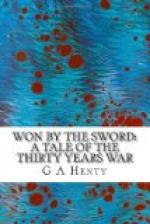Had the defenders here fought with the same courage that they had previously evinced, they would have given time to John de Werth to return, and the fate of the battle would have been doubtful, but they were seized with unreasoning panic, and at once surrendered. The night had long since closed in, and so far as the fighting had gone the battle might be considered a drawn one. The French right and centre were utterly routed, but their left had captured one of the keys of the position and the village behind it. Had John de Werth, when he returned from the pursuit, shown himself an able general, rallied the Imperialists and sent them to recapture the village, and with his victorious cavalry made a circuit of the Weinberg and fallen upon Turenne’s rear, the Imperialist success would have been as complete and striking as that which they had won on nearly the same ground over the Swedes; but although an impetuous leader of cavalry, he had no military genius, and on returning after dark, and hearing that the Weinberg was lost and the village captured, he drew off from the field.
He was joined by the Imperialist infantry, and when the morning broke Turenne’s division stood victors on the field. A number of officers, many standards, and all the cannon of the enemy fell into their hands. Of the French infantry not more than fifteen hundred were rallied after the battle, and of the allied army Turenne’s German troops, although they had suffered severely, alone remained intact. John de Werth retreated with the remains of the Imperialist force to Donauworth, and crossed to the other side of the Danube, although his force was still superior to that of Turenne, for the loss suffered by the French and Turenne’s German troops was very much greater than that of the Imperialists. Enghien, in his despatch announcing the victory, acknowledged in his letter to the queen that it was due to the valour and honour of Turenne.
Nordlingen and Dinkelsbuhl opened their gates to the victors. Enghien fell ill and was forced to return to France, leaving Turenne in command. De Gramont was exchanged for Gleen, and he and Turenne took counsel as to the course that had best be pursued. John de Werth had already recrossed the Danube, and the French generals fell back to Hall, where they remained for twelve days to refresh the troops, provisions being plentiful in the neighbourhood.
But their position was daily becoming more untenable. The Duke of Bavaria, greatly alarmed by the result of the battle of Nordlingen, wrote to the emperor that unless Austria largely increased her force in the field he should retire from the contest, of which he had hitherto borne the brunt, and make terms with the French. The emperor, who had just brought a war with Hungary to a close, despatched the Archduke Leopold, his son, with a great body of horse, and he soon effected a junction with Gleen and John de Werth, and together they pushed forward at the utmost




